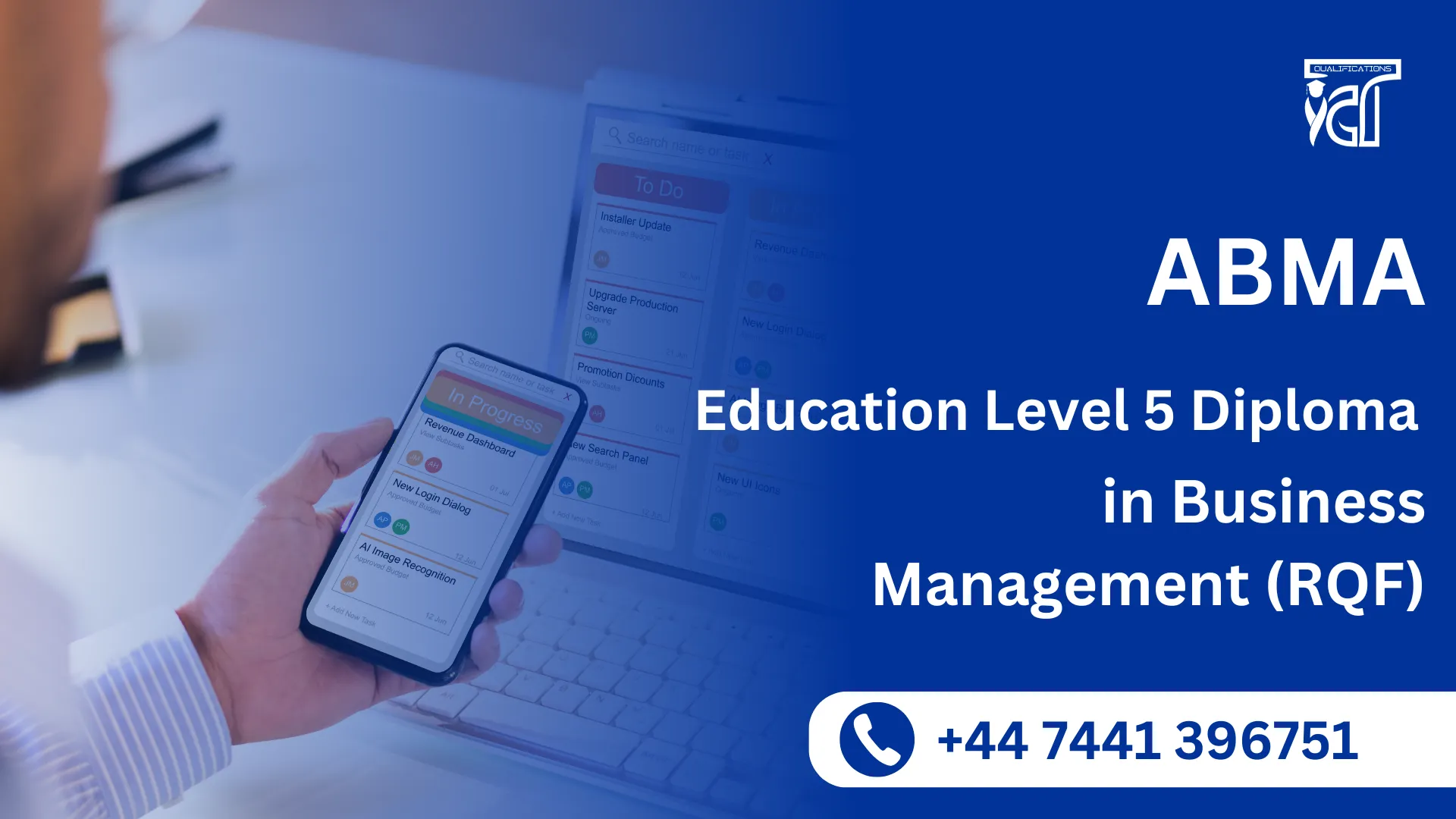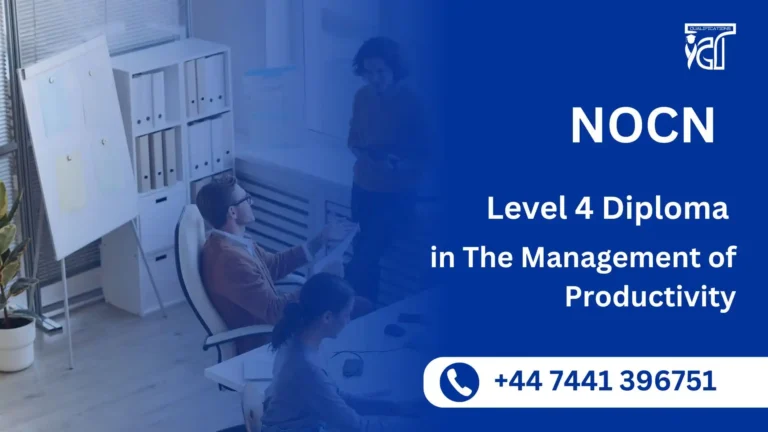In today’s fast-paced and ever-evolving global business landscape, gaining the right qualifications is essential for professional growth and career advancement. The ABMA Education Level 5 Diploma in Business Management (RQF) provides an excellent pathway for individuals looking to enhance their leadership, decision-making, and strategic management skills. This Ofqual-regulated qualification is recognized globally, making it ideal for anyone aiming to make a lasting impact in the world of business.
The ABMA Level 5 Diploma in Business Management (RQF) is a comprehensive qualification designed for individuals who wish to gain a deep understanding of business management at an advanced level. This qualification is Ofqual-regulated, meaning it adheres to rigorous educational standards and is widely accepted both in the UK and internationally. The course covers a broad range of topics, including business strategy, organizational behavior, leadership, marketing, and financial management, making it a perfect choice for those seeking to enhance their career prospects.
The Level 5 Diploma in Business Management is specifically crafted for those aiming to pursue a managerial career or build on their existing business knowledge. It is a completely assignment-based qualification, offering flexibility for working professionals who need to balance studies with personal or professional commitments. The course provides an in-depth understanding of the essential principles and practices of management, preparing students to take on leadership roles and make informed business decisions.
The ABMA Education Level 5 Diploma in Business Management (RQF) is an excellent qualification for individuals looking to take their business career to the next level. With its global recognition, practical focus, and assignment-based learning, it provides a flexible and effective way to develop the skills needed for leadership and management roles. Whether you’re looking to advance in your current career, start your own business, or pursue further academic qualifications, this diploma offers the knowledge and expertise to help you achieve your goals.
ABMA Education Level 5 Diploma in Business Management (RQF)
The ABMA Education Level 5 Diploma in Business Management (RQF), qualification consists of 6 mandatory units of 120 credits, Total Qualification Time: 1200, and Total Guided Learning Hours: 480 for the completed qualification.
| Sr# | Unit Title | TQT | GLH | Credit |
|---|---|---|---|---|
| 1 | Strategic Planning | 200 | 80 | 20 |
| 2 | Supply Chain Operations | 200 | 80 | 20 |
| 3 | Change Management | 200 | 80 | 20 |
| 4 | Human Resource Management | 200 | 80 | 20 |
| 5 | Enterprise and Entrepreneurship | 200 | 80 | 20 |
| 6 | Marketing | 200 | 80 | 20 |
GLH (Guided Learning Hours) and TQT (Total Qualification Time) are terms commonly used in vocational qualifications to help define the amount of time a learner is expected to spend on their studies.
1. GLH (Guided Learning Hours)
GLH refers to the number of hours a learner spends being directly taught, supervised, or supported during their course. This includes the time spent in activities such as:
- Classroom instruction
- Practical workshops
- One-on-one tutoring or mentoring sessions
- Online learning sessions with tutor support
In other words, GLH represents the time that learners are actively engaged with their instructors or learning activities.
2. TQT (Total Qualification Time)
TQT represents the total amount of time a learner is expected to invest in completing a qualification, including:
- GLH (Guided Learning Hours): Time spent on direct learning, as explained above.
- Self-Directed Learning: This includes time spent on independent study, research, assignment completion, preparation for exams, and any other work the learner does outside of direct teaching hours.
TQT is a broader measure that includes all the time required to achieve the qualification. It helps learners and employers understand the overall commitment required for the qualification.
Key Differences Between GLH and TQT:
- GLH focuses on direct learning with guidance or supervision.
- TQT includes GLH as well as independent study time and other learning-related activities.
Example:
If a qualification has a TQT of 600 hours and a GLH of 250 hours, it means the learner should spend 250 hours in direct learning (classroom, online, or tutor-led sessions) and 350 hours on independent study or research.
Learning Outcomes for ABMA Education Level 5 Diploma in Business Management (RQF)
The ABMA Education Level 5 Diploma in Business Management (RQF) provides in-depth knowledge and practical skills across several critical business areas. Here are the learning outcomes for each study unit that ensure the course is valuable, comprehensive, and relevant to the modern business environment.
Unit 1: Strategic Planning
- Understand the concepts of strategic planning and how it aligns with organizational goals and objectives.
- Develop the ability to create a strategic plan that considers internal and external business factors such as market trends, competition, and financial resources.
- Analyze business performance through strategic frameworks and tools such as SWOT, PESTLE, and Porter’s Five Forces.
- Assess the impact of strategic decisions on long-term business sustainability and growth.
- Apply strategic planning techniques to formulate actionable plans that drive organizational success and competitive advantage.
Unit 2: Supply Chain Operations
- Understand the fundamentals of supply chain management and its importance to organizational efficiency and profitability.
- Identify key components of the supply chain including sourcing, procurement, logistics, inventory management, and distribution.
- Analyze supply chain operations to improve cost efficiency, reduce waste, and enhance the overall value chain.
- Apply best practices for inventory control, procurement strategies, and supplier relationships to optimize supply chain performance.
- Evaluate the role of technology in enhancing supply chain operations and streamlining logistics and communication across the value chain.
Unit 3: Change Management
- Understand the theories and models of change management and their practical applications in business.
- Evaluate the organizational impact of change and develop strategies for managing resistance and ensuring a smooth transition.
- Apply change management frameworks such as Kotter’s 8-Step Model and Lewin’s Change Model to real-world business scenarios.
- Analyze the role of leadership in guiding change and building organizational resilience through effective communication and leadership strategies.
- Develop skills in managing cultural change and fostering an adaptive, future-ready organizational environment.
Unit 4: Human Resource Management
- Understand the key principles of human resource management (HRM), including recruitment, retention, performance management, and employee development.
- Evaluate strategies for creating a positive workplace culture, including employee engagement, motivation, and leadership development.
- Develop skills in managing talent, ensuring that recruitment and selection processes align with organizational goals and values.
- Apply HRM techniques to improve employee productivity, morale, and retention through training, development programs, and performance evaluations.
- Analyze legal and ethical considerations in HRM, ensuring compliance with labor laws and fostering a fair and equitable workplace.
Unit 5: Enterprise and Entrepreneurship
- Understand the principles of entrepreneurship and innovation in the context of starting and growing a business.
- Evaluate opportunities for new business ventures by conducting market research and identifying gaps in the marketplace.
- Develop skills in business planning and financial management to support entrepreneurial activities, including budgeting, cash flow management, and resource allocation.
- Apply entrepreneurial strategies to overcome challenges in areas such as product development, market entry, and scalability.
- Analyze the role of innovation and creativity in establishing a sustainable competitive edge for startups and small businesses.
Unit 6: Marketing
- Understand the principles of marketing, including the 4Ps (Product, Price, Place, Promotion) and how to apply them to create effective marketing strategies.
- Evaluate market segmentation techniques to identify and target specific consumer groups based on demographic, psychographic, and behavioral factors.
- Develop strategies for digital marketing, including social media marketing, search engine optimization (SEO), and email campaigns.
- Analyze consumer behavior and market trends to make informed decisions about product development, pricing strategies, and promotional tactics.
- Apply marketing analytics to measure campaign effectiveness and optimize marketing spend for maximum ROI.
Benefits of the ABMA Education Level 5 Diploma in Business Management (RQF)
The ABMA Education Level 5 Diploma in Business Management (RQF) offers numerous advantages for both aspiring and current professionals in the business world. Here are some of the key benefits:
1. Globally Recognized and Ofqual Regulated
- This diploma is Ofqual-regulated, ensuring it meets the highest UK educational standards. It is widely recognized internationally, providing you with a credential respected by employers and educational institutions around the world.
2. Flexible, Assignment-Based Learning
- The course is entirely assignment-based, offering flexibility to work at your own pace. This is perfect for busy professionals who need to balance work, studies, and personal commitments. There are no exams, and you can learn in a way that fits your schedule.
3. Develop Practical Business Skills
- The curriculum is designed to provide practical skills and knowledge that can be immediately applied in the business environment. You will gain expertise in areas such as strategic planning, marketing, human resources, change management, and entrepreneurship, equipping you to take on leadership and managerial roles.
4. Career Advancement Opportunities
- Completing this diploma can open doors to higher-level positions within the business sector. The course provides a strong foundation for managerial and leadership roles in diverse industries, helping you stand out to employers looking for qualified, well-rounded candidates.
5. Pathway to Higher Qualifications
- The Level 5 diploma serves as a stepping stone to further academic studies. You can progress to higher-level qualifications, such as the ABMA Level 6 Diploma in Business Management or even a Bachelor’s Degree in Business. This course provides the knowledge necessary to pursue a career in senior management or entrepreneurship.
6. Enhance Your Leadership and Decision-Making Skills
- The course develops critical leadership skills and enhances your ability to make informed decisions. You’ll be able to guide teams effectively, manage change, and drive the strategic vision of any organization.
7. Increased Earning Potential
- With advanced business management knowledge, your earning potential significantly increases. Having a qualification like this demonstrates your ability to handle complex business challenges, making you a more attractive candidate for higher-paying managerial positions.
8. Real-World Application
- The course focuses on real-world business scenarios and provides you with practical solutions that can be implemented in any business setting. You will develop critical thinking, problem-solving, and analytical skills that will help you tackle business challenges head-on.
9. Gain Expertise in Key Business Areas
- The course covers essential areas of business management, including strategic planning, financial management, marketing, supply chain operations, and human resources. You will gain well-rounded knowledge to thrive in various business contexts and become a versatile business leader.
10. Expand Your Network
- By completing the ABMA Education Level 5 Diploma, you’ll join a global network of alumni and professionals. This can help you build valuable industry connections, share knowledge, and even explore new career opportunities.
11. Entrepreneurial Skill Development
- If you aspire to start your own business, the course offers essential entrepreneurial skills. You’ll learn how to identify business opportunities, create a business plan, and develop strategies for growth and sustainability.
12. Gain Confidence in Your Professional Abilities
- By completing this course, you’ll gain the confidence needed to take on higher-level responsibilities, manage teams, and lead projects successfully. It will empower you to make better decisions and perform at a higher level within your organization.
Conclusion
The ABMA Education Level 5 Diploma in Business Management (RQF) offers a unique combination of practical knowledge, flexibility, and career progression opportunities. Whether you’re looking to advance in your current career, transition into a managerial role, or pursue entrepreneurship, this qualification provides the essential skills and confidence to excel in the dynamic world of business management.
Best Fit for the ABMA Education Level 5 Diploma in Business Management (RQF)
The ABMA Education Level 5 Diploma in Business Management (RQF) is ideal for individuals who are aiming to elevate their careers in the business world or enhance their managerial skills. Below are the profiles of those who would benefit the most from this qualification:
1. Aspiring Business Managers
- This course is perfect for individuals who are looking to step into management positions. It provides the essential knowledge and skills needed to excel in roles such as operations manager, project manager, or department head. The practical focus on strategic planning, HR, and financial management is tailored to those aiming for leadership positions in business.
2. Mid-Career Professionals Seeking Career Advancement
- If you are already working in a business environment and looking to move into more senior positions, this course is an excellent fit. It allows you to build on your existing experience and gain a deeper understanding of management practices, change management, and strategic thinking, making you more competitive for higher-level opportunities.
3. Entrepreneurs and Business Owners
- If you’re an entrepreneur or planning to start your own business, this diploma will provide you with key skills in entrepreneurship, business planning, and market strategies. You’ll gain a solid foundation to manage the operational and strategic aspects of your own business, from supply chain management to leadership.
4. Individuals with a Business Background Seeking Further Education
- If you have completed a Level 3 business-related qualification or have a similar educational background, this course is a great way to expand your knowledge and take your business expertise to the next level. It bridges the gap between foundational business knowledge and senior management expertise.
5. Career Changers to Business Management
- Those who want to transition into business management from a different field will benefit from this course as it offers comprehensive learning in key management areas. Whether you’re coming from a technical, creative, or any other background, this qualification will help you gain essential skills for a smooth career shift into the business world.
6. HR and Operations Professionals
- For those working in human resources, operations, or other business-related functions who aspire to become more effective leaders, this diploma can expand your skill set and prepare you for leadership roles that require a broader understanding of business strategy, finance, and organizational behavior.
7. Those Seeking International Opportunities
- This qualification is globally recognized and Ofqual-regulated, making it an ideal choice for individuals looking for international career opportunities. The course equips you with the essential business management tools to excel in multinational companies or pursue opportunities abroad.
8. Those Interested in Continuing Education
- The ABMA Education Level 5 Diploma in Business Management (RQF) can serve as a stepping stone for further education. Graduates can progress to more advanced diplomas, or even pursue a Bachelor’s or Master’s degree in business-related fields.
Conclusion
The ABMA Education Level 5 Diploma in Business Management (RQF) is designed for anyone who is serious about advancing their career in business management. Whether you are looking to move into leadership roles, start your own business, or simply broaden your understanding of key business concepts, this qualification will provide the tools and knowledge needed to succeed.
Entry Requirements
Register Now
Qualification Process
Qualification Process for the ABMA Education Level 5 Diploma in Business Management (RQF)
- Self-Assessment:
Begin by evaluating your eligibility to ensure you meet the qualification requirements, including work experience, knowledge, and language proficiency. - Registration:
Complete your registration by submitting the required documents, including a scanned copy of a valid ID, and paying the registration fee. - Induction:
An assessor will conduct an induction to confirm your eligibility for the course and explain the evidence requirements. If you do not meet the criteria, your registration will be canceled, and the fee will be refunded. - Assignmnets & Evidence Submission:
Provide all assignmnets and the necessary evidence based on the assessment criteria outlined in the course. If you are unsure of the required evidence, consult with the assessor for guidance on the type and nature of evidence needed. - Feedback and Revision:
The assessor will review your submitted evidence and provide feedback. Evidence that meets the criteria will be marked as “Criteria Met,” while any gaps will be identified. You will be asked to revise and resubmit if needed. - Competence Evidence:
Submit final evidence demonstrating that all learning outcomes have been met. This evidence will be marked as “Criteria Met” by the assessor once it is satisfactory. - Internal Quality Assurance (IQA):
The Internal Quality Assurance Verifier (IQA) will review your evidence to ensure consistency, quality, and compliance with standards. - External Verification:
The IQA will submit your portfolio to ABMA External Quality Assurance Verifiers (EQA) for final confirmation. The EQA may contact you directly to verify the authenticity of your evidence. - Certification:
Upon successful completion of all checks, ABMA will issue your official certificate, confirming that you have attained the ABMA Education Level 5 Diploma in Business Management (RQF).







